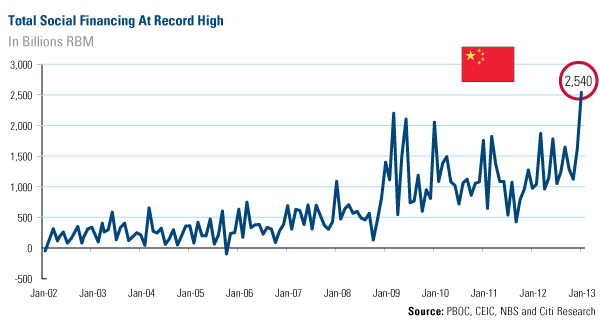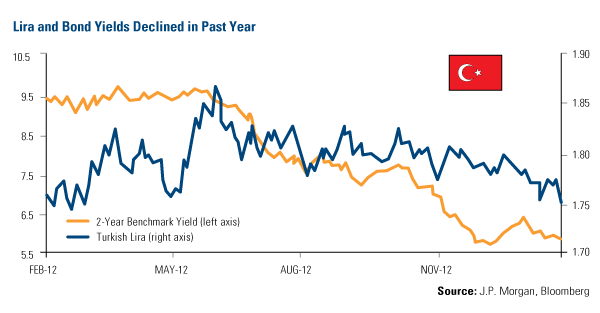Emerging Markets Radar (February 11, 2013)
Strengths
- China January money supply (M2) was up 15.9 percent year-over-year, beating the market estimate of 14 percent. New January bank loans were Rmb1.07 trillion, or 15.4 percent year-over-year, better than the market expectation of Rmb1 trillion. Total Social Financing increased Rmb2.54 trillion versus Rmb1.63 trillion in December last year.
- China January exports were up 25 percent year-over-year, better than the market estimate of 17.5 percent; imports were up 28.8 percent, also beating the market expectation of 23.5 percent. In spite of belated January base effect last year, the number showed a positive trade trend which can drive up shipping rates and port throughput.
- China January Consumer Price Index was in line with the market expectation at 2 percent year-over-year, and the Producer Price Index was also in line with market expectation down 1.6 percent, which was improved from negative 1.9 percent in December, showing the demand recovery.
- China January passenger vehicle sales were up 49 percent year-over-year, primarily due to a lower base last year and higher demand prior to Chinese New Year which falls on February 10.
- Hong Kong loan and deposit (ex-Rmb) grew 9.6 and 8.8 percent in 2012. Annualized fourth quarter loan and deposit growth rose to 11.2 and 18 percent respectively, supporting a robust property market.
- China January HSBC service Purchasing Managers Index was 56.7 percent versus 51.7 percent in December, driving a strong service sector performance in H shares.
- Chilean exports surged 7.4 percent to $6.94 billion in January year-over-year on the back of increased demand for copper exports to China. The resulting $244 million trade surplus crushed analyst expectations for a $120 million trade deficit.
Weaknesses
- Increasing fears of government intervention in curbing the housing market had caused negative sentiment for developer stocks in Hong Kong listed H shares in spite of robust January sales and price increase.
- Indonesia 2012 GDP growth slowed to 6.2 percent versus 6.5 percent in 2011, primarily due to business unfriendly regulations and weak global commodity demand over the past year which dampened investment and consumption growth, though the economy is still robust.
- The Colombian government has suspended Drummond’s coal port operating license as it investigates the company’s responsibility in the dumping of a coal load into the ocean earlier this year. This added to the work stoppage at Cerrejon Mine, Colombia’s largest coal producer by output, has brought 80 percent of the country’s coal production to a halt. Colombia is the fourth largest coal exporter in the world with an annual output of 91 million tons.
Opportunities

- The chart above shows China January total social financing increased to a record high, indicating China’s investment demand is in momentum. Recent data also showed M1/M2 ratio is turning up after being on the down trend for most of 2012. This indicates that faster deposit growth allows the banks to lend more to the economy, confirmed by better-than expected January bank loans.
- Peru’s Central Bank President Julio Velarde has encouraged pension funds to increase their investments abroad in an attempt to devalue the sol from a 16-year high. The Finance Minister of Colombia has vowed to decrease U.S dollar borrowing in favor of local currency borrowing and to narrow the fiscal deficit in an attempt to prevent further Colombia peso revaluation.
- An almost 10 percent correction in Turkish stocks since the recent high presents a buying opportunity, according to J.P. Morgan. There has been no change in the macro outlook, as evidenced by the practically unchanged bond yields and lira exchange rate.

Threats
- The People’s Bank of China (PBOC), the central bank, warned of inflation pressure as global central banks are increasing money supply through quantitative easing. Though there probably is no immediate inflation threat in 6 to 9 months, the price increase for energy, materials and food (please refer to the natural resources section of this report) year-to-date are indeed at relatively fast pace and threatens China as the country’s investment demand is recovering.
- Brazil has vowed to allow the Brazilian real to appreciate a further 5 percent before resuming its currency intervention policy amid stagflation concerns. The expansive monetary policy pursued over much of last year accelerated inflation to 6.15 percent while GDP growth remained around the 1 percent level.
- Regulatory action, competitive pressure, and austerity measures are impacting revenue recovery of Eastern European telecom companies, making it difficult for them to maintain current high dividend yields.











